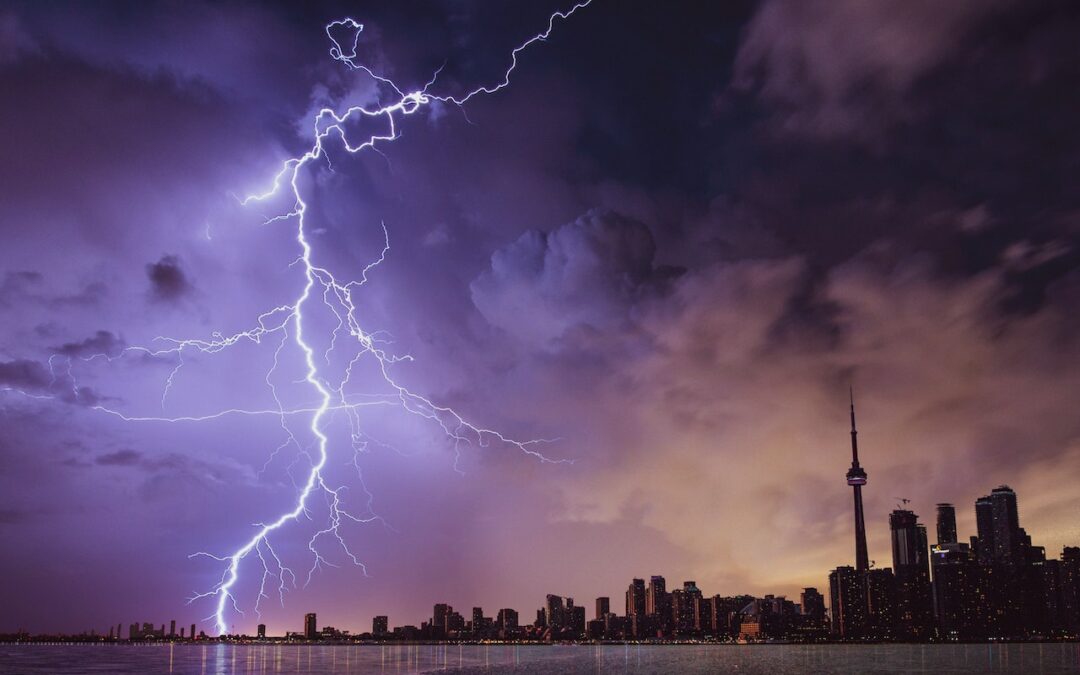Have you ever had a series of little frustrations, forgivable mistakes, or short delays to your schedule suddenly “balloon” in significance — becoming something bigger and more daunting than all the little events, all on their own, actually were?
If so, you’ve experienced what I like to call a “story storm”.
A “story storm” is an unconscious story — a sneaking, quiet narrative — that slowly gathers in the recesses of our minds, beyond our awareness.
Stories like these gather because our brains are meaning-making machines.
The human mind constructs meaning, senses patterns, and creates stories, all the time.
But when our minds start to make patterns out of disconnected events, random occasions, and sheer coincidences, we may begin to sense that the odds are stacked against us; that people, the world around us, or even life itself(!), are conspiring to frustrate, slow down, or undermine us.
Unconsciously, beneath the surface of our awareness, a low hum of mounting frustration and anxiety may begin to grow louder and louder until, in a single pop of angst, we lash out.
I saw the whole potential for a scenario like this a few weeks ago when I went for some routine blood work, and a 10-minute detour from my morning routine one day started to feel like a much bigger hassle than it actually was.
Thankfully, my compassion and empathy for my nurse, who I could see was having an even harder time trying to administer my bloodwork, to no fault of her own, diffused any mounting frustration or angst — that “story storm” — that may have threatened to overtake me.
But the experience, as a whole, led me to wonder,
“What is it about when small things go sideways and seem to go sideways for long enough, that gets us all roiled up? Why do little things, compounding into one another, begin to feel like something bigger than they actually are, on their own?”
🐾
I began to answer this question when I wrote you last and suggested that the little sources of frustration, even disconnected and unrelated to one another, seem to gather meaning and significance when all lined up in a row.
In other words, our minds construct a story out of unrelated events out, connecting them where there is no real connection and, in turn, unconsciously creating a singular narrative.
And yet, I realize, that is not the only source of “story storms” — the unconscious, sneaking narratives that tend to overtake our rational minds on an ordinary day when things seem to suddenly go sideways.
Take, for example, the untold frustration that can arise when you suddenly find yourself in a traffic jam.
Maybe you’ve been commuting to work, or maybe you have an appointment to make. You have somewhere you’re going; you have somewhere to be. Suddenly, a snarl of traffic slows you to a stop.
Besides the obvious frustration (ie. not getting where you’re going) and the basic source of discomfort (ie. vulnerability from a total lack of control to change the circumstance), why does getting caught in traffic aggrieve us and upset us so?
Or how about another situation that’s less predictably frustrating than a traffic jam, like when we pop into our local coffee shop and see the line at the register is six or seven customers deep, instead of the usual one, or zero?
Is it really the waiting a few more minutes that sparks something deeply frustrating in us, and stirs a story storm toward over our shores?
I suspect, in most cases, the actual source of deep existential frustration comes from experiencing a divergent reality from our initial, well-established expectations of ease, familiarity, and comfort.
🐾
When we hold certain expectations of what will happen, based on perhaps many, many previous examples and experiences from the past, the divergent reality — how “what is happening” is different than what we expected — can trigger a low-grade reaction that feels far bigger inside us than the actual circumstances would imply.
Whether in a few minutes of traffic on the highway or being stuck behind someone who can’t decide between two specialty lattes, a story storm gathers between our once-comforting expectations and this now sudden, unknown, divergent reality.
I’ve been there in both cases, wondering why I suddenly find myself in the throes of what feels like a miniature existential crisis:
Why is this taking so long?
Did I make a mistake?
Am I to blame?
Is this purgatory? Am I stuck here forever?!
Based on past experiences — data points, from which we’ve developed a sense of familiarity, comfort, predictability, and therefore ease — we come to expect a very brief, uninterrupted drive to the office or detour for our afternoon latte.
However, when those “safe” expectations turn out to be wrong — when we experience “a divergent reality” from the one we were expecting — a moment of disrupted chaos may well ensue, sparking strangely intense feelings; a disproportionate reactivity to a not-immensely-disrupted reality.
A story storm gathers.
🐾
When “story storms” arise in the course of my daily life, in most cases, the simplest and most effective solution to dissolving the gathering storm is a shift in perspective.
By using our cognitive and imaginative abilities, we can take a moment or two to shift our perspective and step outside of the gathering inner narrative of angst, frustration, or anxiety.
Ask yourself the following:
- How can you think about what’s happening in a different way? From a slightly different perspective? From just 1 degree to the left or the right?
- Better yet, how can you feel the situation in a different way?
- Can you imagine yourself, just for a moment, in the shoes of another person who may be experiencing the situation more severely than you are?
In the case of my blood work experience, feeling the angst, mounting anxiety, and helplessness of my nurse was enough to get out of my own pattern of frustration and see that she was in a far worse predicament than I was:
“She has to be here; I can come and go.”
“She is stuck with these old systems and frustrating policies from her employer; I am not.”
“She will have to deal with them, again and again; not me.”
“She must deal with many impatient, self-righteous ‘busy people’ all the time; I don’t want to be one of them.”
🐾
When it comes to a traffic jam, think of those who may be affected by the fender bender — or worse — that is causing the delay.
When it comes to the long line at the coffee shop, think of the teenage barista whose first job this is and who is totally overwhelmed by the rush of far-more-grown and immediacy-expecting adults (who treat their caffeine fix like it’s life-saving insulin).
A slight shift in perspective, especially stepping outside of your own internal experience for a moment to empathize, imagine, relate to, or feel compassion for another who is in proximity to the story you’re in, can go a long way to resolving a story storm before it makes a mess of things.
Where and in what ways, I wonder, do you experience your own “story storms” — the seemingly sudden, gathering narratives of angst, frustration, worry, or anxiety that threaten to overtake you, on a given day?
Does it happen at work?
Does it happen in your inbox?
Do you feel them happening more now than perhaps you can remember on the street, in your neighborhood, or in your own backyard?
What meaning do you make of your story storms?
And, might practicing deliberate, conscious perspective shifts be a potential source of slight, if helpful, reprieve?

